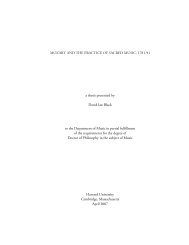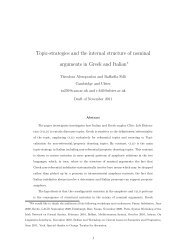Subjects, Topics and the Interpretation of Referential pro.
Subjects, Topics and the Interpretation of Referential pro.
Subjects, Topics and the Interpretation of Referential pro.
Create successful ePaper yourself
Turn your PDF publications into a flip-book with our unique Google optimized e-Paper software.
The subject QP in sentence (23) can ei<strong>the</strong>r have a specific interpretation <strong>and</strong> imply a<br />
quantification over events (wide scope interpretation), according to which ‘some specific<br />
students have filed every book at different times’, or a distributional interpretation (narrow<br />
scope), according to which ‘each book was filed by different students’. This means that<br />
preverbal subjects in Italian are not always interpreted as specific <strong>and</strong> can sit in an Aposition,<br />
preserving <strong>the</strong> scopal <strong>pro</strong>perties <strong>the</strong>y had before movement (like in Spanish, cf.<br />
Suñer 2003). However, when <strong>the</strong> relevant ‘subject’ QP serves as <strong>the</strong> antecedent for a<br />
following <strong>pro</strong>, a specific reading (wide scope) is <strong>the</strong> only possible interpretation (24), exactly<br />
as is <strong>the</strong> case <strong>of</strong> CLLD objects (25) (cf. A&A 1998, p. 505):<br />
(24) [qualche studente]k ha archiviato ogni libro della biblioteca e<br />
some student have.3SG filed every book <strong>of</strong>-<strong>the</strong> library <strong>and</strong><br />
<strong>pro</strong>k è stato premiato.<br />
be.3SG been prized<br />
‘Some (specific) student filed every book in <strong>the</strong> library <strong>and</strong> got a prize.’<br />
(25) [qualche studente]k lok ha interrogato ogni pr<strong>of</strong>essore<br />
some student him have.3SG interviewed every pr<strong>of</strong>essor<br />
‘Some (specific) student was examined by every pr<strong>of</strong>essor.’<br />
Given <strong>the</strong> exclusion <strong>of</strong> a narrow scope reading, we must conclude that <strong>the</strong> preverbal QPs in<br />
(24)-(25) are base-generated in an A'-position (as is argued in Cinque 1990 for specific bare<br />
quantifiers like qualcuno in CLLD constructions like qualcunok lok troveranno ‘somebodyk<br />
<strong>the</strong>y will find himk’).<br />
Additional evidence in this direction comes from <strong>the</strong> scopal interaction between an<br />
indefinite <strong>and</strong> a QP. In Italian (like in Spanish, cf. Suñer 2003, p. 344), sentences like (26) are<br />
ambiguous (between ‘for every corner <strong>the</strong>re is a different policeman’ <strong>and</strong> ‘<strong>the</strong> same<br />
policeman is in different corners’). However, a specific (wide scope) interpretation is only<br />
possible in (27), in which un poliziotto serves as <strong>the</strong> antecedent for a following <strong>pro</strong>:<br />
(26) Un poliziotto stava a guardia di ogni angolo.<br />
a policeman be.PAST.3SG at guard <strong>of</strong> every corner<br />
‘A policeman guarded each corner.’ (ambiguous)<br />
(27) Un poliziotto k stava a guardia di ogni angolo e<br />
a policeman be.PAST.3SG at guard <strong>of</strong> every corner <strong>and</strong><br />
<strong>pro</strong>k fumava in continuazione.<br />
smoke.PAST.3SG in continuation<br />
‘A (single) policeman guarded each corner <strong>and</strong> was smoking continuously.’<br />
As for binding <strong>pro</strong>perties, <strong>pro</strong>nominal subjects can serve as bound variables in<br />
postverbal position (28a), while this function is excluded for preverbal strong <strong>pro</strong>nouns (28b).<br />
This contrast shows that <strong>the</strong> former are located in an A-position, while <strong>the</strong> latter have <strong>the</strong><br />
<strong>pro</strong>perties <strong>of</strong> A'-constituents (with a shifting function). 36<br />
(28) a. [ogni pilota]k pensa che vincerà luik la gara.<br />
every pilot think.3SG that win.FUT.3SG he <strong>the</strong> race<br />
‘[Every pilot]k thinks that hek will win <strong>the</strong> race.’<br />
36 On <strong>the</strong> possibility <strong>of</strong> ogni-NP as an antecedent for <strong>pro</strong>, see discussion in section 6.2.<br />
21
















